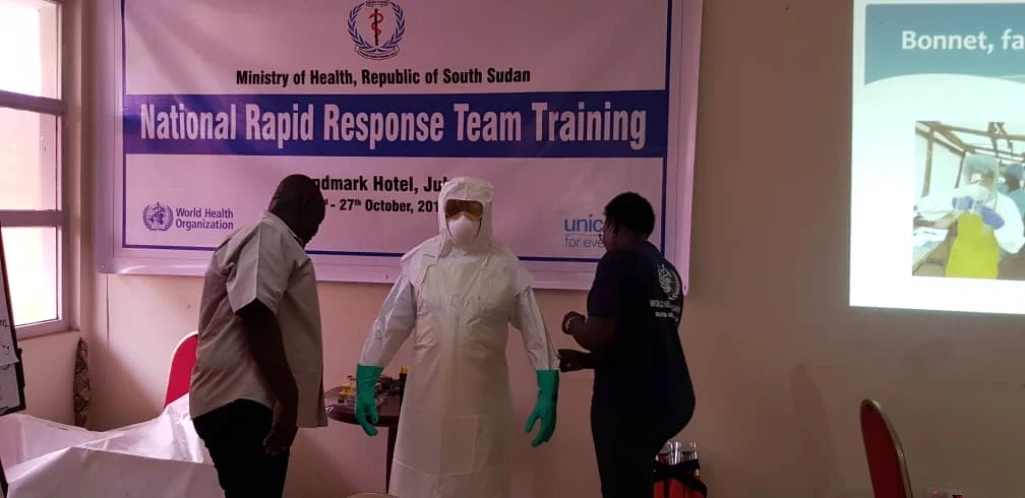
South Sudan is deploying two national assessment teams to the border points with Uganda and the Democratic Republic of Congo following an outbreak of Ebola announced by Uganda on Tuesday.
Earlier today, Uganda health authorities and the World Health Organization (WHO) confirmed a case of the relatively rare Sudan strain after a 24-year-old man in central Mubende district showed symptoms and later died.
The patient with the confirmed case had high fever, diarrhoea and abdominal pains and was vomiting blood. He had initially been treated for malaria.
WHO’s Africa office said there are currently 8 suspected cases receiving care in a health facility.
In reaction, South Sudan will dispatch medical teams to Nimule and Yambio to monitor the border entry points.
The Ministry of Health identified Juba, Nimule, Kaya, Yambio, Ezo, Maridi, Kajokeji, Tambura and Yei as high risk areas with a lot of movement between the border points.
The teams will be sent starting September 21, 2022 to assess the readiness capacity of the high risk areas in terms of surveillance, Lab, ETU and IPC.
In a meeting with health partners on Tuesday at the Emergency Operation Center in Juba, the government rated it response readiness capacity at 37% – 61% based on their checklist.
“We have activated the incident management system…meaning the state structure like technical working groups, surveillance team, and rapid response team will be activated, we have taken some step; from tomorrow (Wednesday), two team will be deployed at the borders in Yambio and Nimule so that they will be able to do the assessment given the fact that they are at the border.” said Victoria Anib, Undersecretary in the Ministry of Health.
The ministry has proposed ways to ensure the country is ready with its response to any possible outbreak of the virus.
The plan includes; the establishment of state taskforce and technical working groups by the national team to engage the local leadership to coordinate response, deployment of surveillance teams to high risk areas for active surveillance in health facilities and communities, reinforcement of screening at the border points with hand washing stations and training of EVD teams on priorities such as surveillance, contract tracing, follow up, risk communication, community enjoyment and infection prevention and control.
The government also said it will enforce infection prevention measures, facilitate the setting up of an EVD treatment centers and deployment of an ambulance for safe referral to a nearby isolation units.
For his part, Dr. Fabian Ndenzako, the Country Representative of the World Health Organization to South Sudan assured the government of its full support in its preparation measures.
“We had system that the government and other partners have done before. So we will be building on that. So with this activation, all the partners including WHO will beginning helping the ministry to make sure we prepare better but also responds.” Ndenzako said.
Although there is currently no cause for alarm in South Sudan, Victoria Anib urged the public to be vigilant and report any suspicious case of the virus to the authorities.
“The citizens should be on alert and most importantly those who are at the border towns have to watch out [and] if there is any suspected case of someone with fever, bleeding or any other symptoms, they need to present to the nearest facility for an assessment and also to avoid eating bush meat because that is one of the sources of infection. So they have to be very careful about that.”
Ebola Virus Disease (EVD) is a rare and deadly disease in people and nonhuman primates.
People can get EVD through close contact with the blood, secretions, organs or other bodily fluids of infected animals such as fruit bats, chimpanzees, gorillas, monkeys, forest antelope or porcupines found ill or dead or in the rainforest.
The incubation period, that is, the time interval from infection with the virus to onset of symptoms, is from 2 to 21 days. A person infected with Ebola cannot spread the disease until they develop symptoms.
Symptoms of EVD can be sudden and include fever, fatigue, muscle pain, headache, sore throat, vomiting, diarrhoea, rash.
In some cases, both internal and external bleeding (for example, oozing from the gums, or blood in the stools).
According the World Health Organization, supportive care – rehydration with oral or intravenous fluids – and treatment of specific symptoms improves survival. A range of potential treatments including blood products, immune therapies and drug therapies are currently being evaluated.